
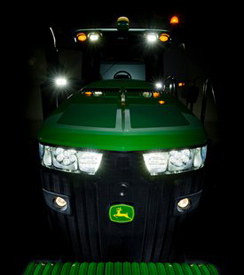 Premium lights
Premium lights
The 7R, 8R, and 8RT Series Tractors feature two lighting package options:
The cab lighting pattern provides 330 degrees of coverage while the hood lighting provides the remaining 30 degrees for completely programmable 360-degree, stadium-style lighting. This ensures there are no dead zones or lighting adjustments needed. The lighting configurations are available to match various applications and ensure maximum around-the-clock productivity.
Bulb housings are large, allowing for optimum total lumens and available light. The standard lighting packages use 65-W halogen bulbs, whereas the premium lighting package uses light-emitting diode (LED) lights. In the premium lighting package, these tractors take advantage of the high-performing and efficient LED technology.
The low- and high-beam driving/work lights are adjustable. Please refer to the electrical section in the operator’s manual for complete details on adjusting lights.
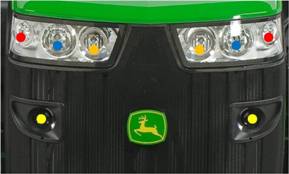 7R/8R/8RT lighting
7R/8R/8RT lighting
Yellow circles
Red circles
Blue circles
Orange circles
|
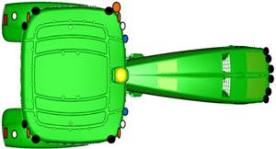 Standard lighting (8R)
Standard lighting (8R)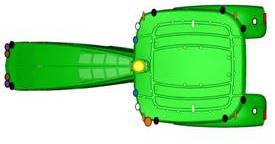 Standard lighting (7R)
Standard lighting (7R)Six front grill-mounted lights:
10 cab roof-mounted lights:
Other lights:
Plus these lights:
Eight front grill-mounted lights:
12 cab roof-mounted lights:
Other lights:
The premium lighting package replaces all previous halogen and HID lights with LED lights. The only lights that are not LED are the low-beam driving lights, they remain halogen. This allows each LED light to work at a lower temperature and no one light works harder than any other. The uniformity in LED coverage allows only one type of light output surrounding the tractor.
The lighting pattern in the premium package provides industry-leading performance in nighttime visibility. LED bulbs provide maximum brightness and a true color output for excellent field definition that is easy on the operator's eyes.
The LED lights provide 40 percent greater coverage width and 10 percent more light coverage in the rear. LED lighting packages use 45 percent less amps than standard halogen lights and have an increased life expectancy over HID lights which leads to lower costs of ownership over the life of the tractor.
NOTE: Lighting packages may vary depending on region.
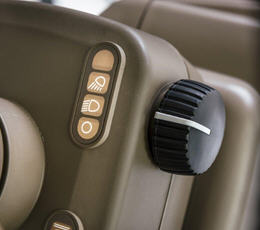 Lighting mode selector
Lighting mode selector 
Operators can quickly select a lighting mode on the steering console:
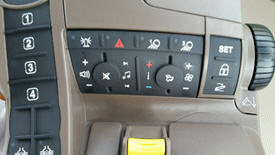 The CommandCenter™ display
The CommandCenter™ displayThe CommandCenter display allows operators to customize light settings. Operators can select only the lights they need or want for a given application and store these settings. The operator-programmed configurations can then be turned on or off with the push of a button on the CommandARM™ controls.
NOTE: Road/loader lights are also referred to as high-mounted driving lights for use in front hitch applications that obscure the headlights. See the Attachments section.
The battery power saver feature is also standard. When the engine is off and the outside lights have been left on, this feature is designed to avoid battery run down.
After the lights have been left on for 30 minutes and the key is in the off position, the lights cycle or blink on and off five times as an alert. The lights continue to illuminate for one more minute and then automatically shut off to protect the battery.
Field-installed options are also available. To find this information, use the Build Your own Configurator application for US/Canada or Build & Price in John Deere Sales Centre for Australia/NZ.
Another feature is programmable exit lighting. Exit lighting allows the lights outside the cab to stay on for up to 300 seconds. They can be programmed in increments from 0 to 300 seconds.
Refer to the operator’s manual for complete instructions on programming field, driving, and exit lighting.
| Option code | Description |
| 7201 | Standard lighting |
| 7206 | Premium lighting |
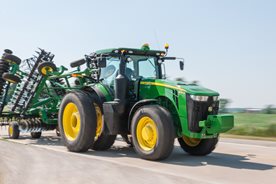 8R in transport
8R in transport
With ACS, John Deere has designed one of the most robust and full-encompassing steering system in the industry. Whether in the field or on the road, ACS reduces steering effort, which can result in reduced operator fatigue and can improve operator comfort.
There are four key features of the ACS system:
Dynamic road wheel offset:
Variable ratio steering:
Elimination of steering slop and hand wheel drift:
Variable effort steering:
The ACS system is fail operational, which means steering is still functional in the event of any single-point failure. John Deere has gone to great lengths to help ensure the operator has the ability to steer the tractor if something goes wrong in the steering system.
For example, if the primary controller fails, a second controller takes over. If power from the alternator fails, the battery resumes control. If the engine quits running and is unable to supply hydraulic oil to the system, an electric-driven backup pump is used to supply the oil. There is a backup for ACS components.
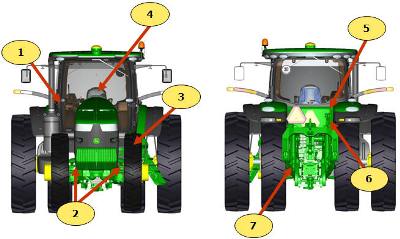 ACS components
ACS components
The ACS system consists of several key components:
The brakes are designed with large-diameter rear disc brakes and powerful activating pistons. The brakes run in oil for cooling and long life in the most demanding situations. Braking in the field during a turn can be accomplished with light pedal effort and excellent modulation of brake forces.
Hydraulically actuated, power wet-disc brakes:
An integrated park brake is included with all transmission options.
Front wet-disc brakes are included on 8R Series Tractors equipped with the 50-km/h (31-mph Independent-Link Suspension (ILS™) axle and 7R Series Tractors equipped with a 50-km/h (31-mph) Triple-Link Suspension (TLS™) Plus front axle. Front Brakes are optional equipment on the 8R 42-km/h (26-mph) ILS axle and 40-km/h (25-mph) TLS Plus front axles.
Foot brakes on tractors equipped with AutoPowr™/Infinitely Variable Transmission (IVT™) transmissions have an integrated AutoClutch™, as described in the IVT section. Similarly, foot brakes on tractors equipped with e23™ transmissions have integrated AutoClutch™, as described in the e23 section.
For towing very large loads, the 7R and 8R Series Tractors can be equipped with a complete air-brake-system or a hydraulic brake coupler, or both. The brakes supply air or oil pressure to a brake-equipped trailer or implement.
All 8R and 8RT Series Tractors come standard with an 85-cc displacement integrated hydraulic pump. This pump provides 227.1 L/min (60 gpm) of hydraulic flow.
A dual-pump option, featuring 85-cc and 35-cc displacement hydraulic pumps, is available for all 8R wheel models. The dual-pump system provides a hydraulic flow of 321 L/min (85 gpm), ideal for running at lower engine speeds.
SCV flow (approximate) | ||
Engine rpm | Pump flow (85-cm3 pump) L/min (gpm) | High pump flow (85-cm3 pump + 35-cm3 optional pump) L/min (gpm) |
800 | 86 (23) | 122 (32) |
1500 | 162 (43) | 229 (61) |
1700 | 184 (49) | 260 (69) |
1900 | 206 (54) | 290 (77) |
2100 | 227 (60) | 321 (85) |
Operating the tractor at reduced engine rpm contributes to a quieter cab, reduced fuel usage, and maintains the vacuum while turning and raising the planter on end rows. At 1500 erpm with a 321 L/min (85 gpm) system there will be an available flow of 229 L/min (61 gpm). This is an improvement over an available 162 L/min (43-gpm) flow when operating with a 227 L/min (60 gpm) system at 1500 erpm.
The maximum flow through one selective control valve (SCV) with a standard coupler is 132 L/min (35 gpm). A 19.1-mm (3/4-in.) high-flow coupler allows for a maximum flow rate out of one SCV of 153 L/min (40.5 gpm).
The hydraulic system is a closed-center, power-on-demand system using a load-sensing pressure-flow compensated axial piston pump with full-flow charge and flow prioritization for steering and brakes.
The pump outlet pressure available on demand can range from 3000 kPa (435 psi) for track models and 4000 kPa (580 psi) for wheel models at low standby to 20,400 kPa (2958 psi) at high standby.
Hydraulic pump options:
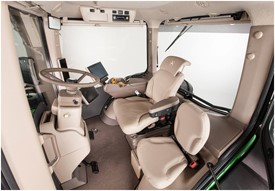 CommandView III cab
CommandView III cabThe Premium CommandView III cab offers unsurpassed visibility, operator comfort, control placement, and ride and sound quality.
Features:
8RT Series Tractors feature the Premium CommandView III cab with cab suspension in base. Producers will enjoy all the features they have come to expect in the Premium CommandView III cab plus the addition of improved ride quality in the field and on the road with the cab suspension. The cab suspension, combined with the proven AirCushion™ suspension system, will give John Deere operators the most comfortable operating experience available in a two-track tractor.
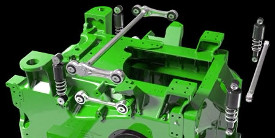 Four-corner cab suspension system
Four-corner cab suspension system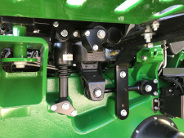 Cab suspension components
Cab suspension components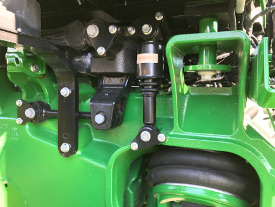 Cab suspension components
Cab suspension components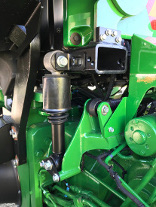 Cab suspension components
Cab suspension components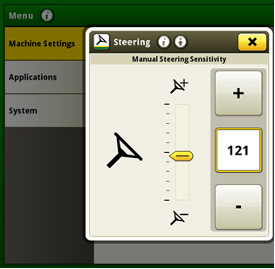 Steering sensitivity adjustment screen
Steering sensitivity adjustment screen Steering pump and loop override circuit
Steering pump and loop override circuitSteering circuit change and steering sensitivity adjustment
8RT Series Tractors include an improved steering pump, changes to the loop-override circuit, and in-cab steering sensitivity adjustment.
The improved steering pump and changes to the loop-override circuit increase steering response and steering authority on 8RT Series Tractors. Operators will notice this change when working in heavy draft, soft field conditions, and obstacle avoidance. The steering pump and loop-override circuit give the 8RT the ability to turn under load like no other two-track tractor in the industry.
8RT steering sensitivity adjusted in the 4600 CommandCenter Display
This feature allows operators to fine tune the steering system based on the application or environment.
Steering sensitivity adjustment does not only help when steering the tractor manually. Operators using guidance systems will also experience improved response with the ability to input tractor tread settings in the 4600 CommandCenter Display. From there, the tractor will control the steering pump to ensure steering is consistent no matter which tread setting the operator is utilizing.
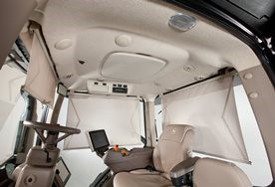 Pull-down sunshades
Pull-down sunshadesThese variable-length sunshades provide excellent adjustability to keep direct sun off of the operator. Perforations in sunshade material provide visibility through the sunshade as well. The sunshades are also recessed into the headliner for storage when not in use.
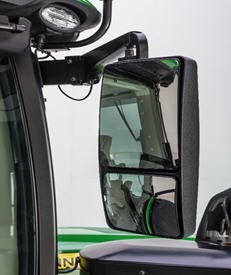 Right-hand mirror shown on 8RT Series Tractor
Right-hand mirror shown on 8RT Series TractorRight and left outside wide-angle mirrors are electrically adjustable with simple in-cab adjustments to view variable-width implements, wagons, or carts. The in-cab controls are located directly above the radio.
The leather seat option is available on 8RT Series Tractors. The kit includes leather operator seat, leather instructional seat, leather-wrapped steering wheel, rear window decal, and carpet floormat.
NOTE: The leather comfort package is not available with Scraper Special Tractors.
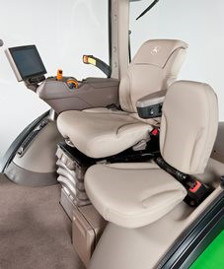 Leather seats
Leather seats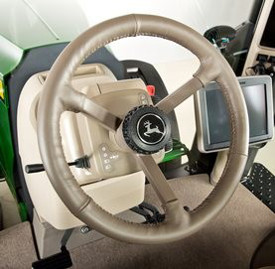 Leather-wrapped steering wheel
Leather-wrapped steering wheel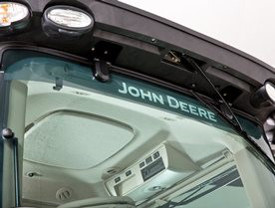 Rear window decal
Rear window decal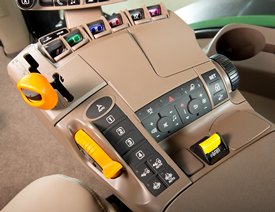 CommandARM controls
CommandARM controlsJohn Deere 8RT Series Tractors feature the CommandARM with integrated Generation 4 CommandCenter display. The control layout of the CommandARM utilizes a clean and efficient design which groups controls by function and builds upon John Deere’s history of intuitive and ergonomic control placement and operation. The CommandARM control’s design allows for a 40 degree right seat swivel and adjustable positioning matching the operator’s preference.
Controls located on the CommandARM include:
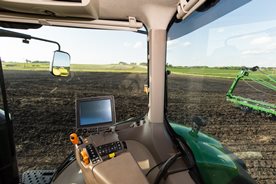 Seat swivel
Seat swivelThe design of the CommandARM controls allows for up to 40 degrees of right-hand seat swivel.
John Deere 8RT Series Tractors equipped with the e23 transmission with Efficiency Manager feature or AutoPowr™ IVT transmission feature either a left-hand or right-hand reverser.
The transmission control lever is placed on the CommandARM control’s left side closest to the operator for convenient setting and adjustment.
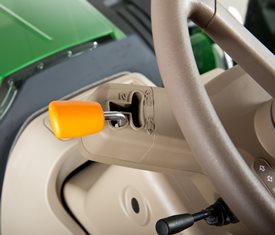 Left-hand IVT and PowerShift™ transmission reverser
Left-hand IVT and PowerShift™ transmission reverser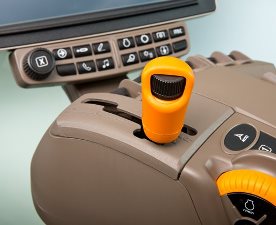 Right-hand IVT and PowerShift transmission reverser
Right-hand IVT and PowerShift transmission reverser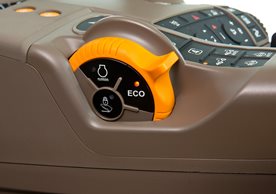 Throttle
Throttle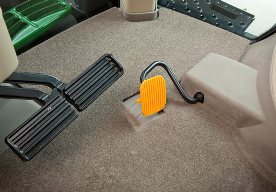 Foot throttle
Foot throttle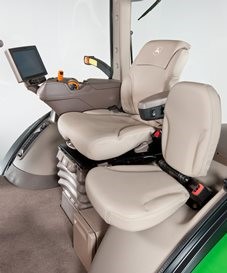 ComfortCommand seat
ComfortCommand seatThe ComfortCommand seat with air suspension improves ride quality and helps to reduce operator fatigue. The ComfortCommand seat with air suspension is offered with cab suspension. The ActiveSeat™ is available on fixed cab tractors.
Features include:
Hydraulic and hitch controls utilize fingertip paddle pots for raise/lower and extend/retract functions. An optional crossgate joystick replaces fingertip paddle pots for control of SCVs and allows for programmable hydraulic functionality according to operator preference. Rear hitch position can also be controlled with the encoder wheel located on the right side of the CommandARM. The encoder wheel allows for finite positioning of the rear 3-point hitch.
Three buttons near the encoder are for hitch set, lock, and return to height. Adjustment for the 3-point hitch is done via the CommandCenter display.
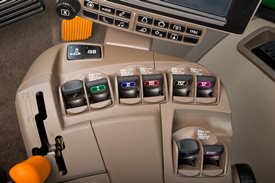 Fingertip paddle pots
Fingertip paddle pots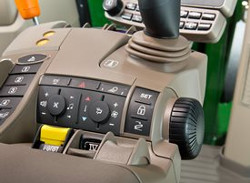 Encoder wheel
Encoder wheel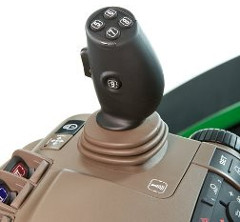 Optional crossgate joystick
Optional crossgate joystick
The throttle design incorporates buttons which control FieldCruise speed, foot pedal mode (if equipped), and transmission eco settings.
Located just to the right of the throttle is the AutoTrac activation button and four sequence controls for iTEC functions.
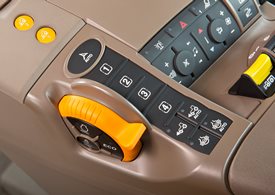 AutoTrac resume and iTEC strip
AutoTrac resume and iTEC stripControls for radio, lights, rotary beacon (if equipped), hazard flashers, and HVAC system are located to the center-right on the CommandARM, along with PTO for both front (if equipped) and rear.
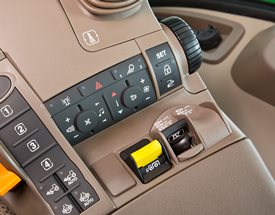 Radio, HVAC, hazard flashers, and PTO controls
Radio, HVAC, hazard flashers, and PTO controls
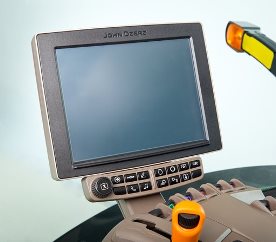 Generation 4 CommandCenter display
Generation 4 CommandCenter displayThe Generation 4 CommandCenter displays feature fast adjustment of tractor functions and controls and are integrated into the CommandARM to create a seamless control center. The 4600 CommandCenter features a 26.4-cm (10.4-in.) touchscreen display and is standard equipment on 8RT models.
The following functions can be adjusted using the CommandCenter display:
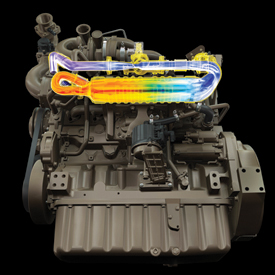 PowerTech™ PSX 9.0-L engine
PowerTech™ PSX 9.0-L engine
How exhaust gas recirculation (EGR) works
EGR reduces the high temperatures where nitrogen oxide (NOx) compounds are formed in the engine cylinders by replacing excess oxygen with a prescribed amount of cooled exhaust gas.
Exhaust gases contain more carbon dioxide than oxygen. The EGR valve in conjunction with the venturi and engine control unit (ECU) allows a controlled amount of exhaust gas to enter the intake manifold to mix with the incoming fresh air. Replacing excess oxygen with cooled exhaust gas leads to lower combustion temperatures, creating less NOx. In addition, EGR allows for advanced timing, leading to optimal performance of the engine, maximizing fuel economy.
The following diagrams illustrate how air flows through the engine.
For added performance and efficiency, the engine passes the exhaust gases through an EGR cooler before it enters the engine.
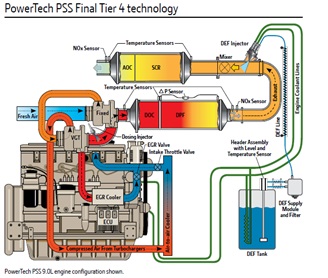 PSS engine diagram
PSS engine diagram
Flow of exhaust during engine operation
Exhaust airflow enters into the EGR cooler from the exhaust manifold near the turbocharger.
Based on engine load, air temperatures, and rpm, the engine control unit (ECU) opens or closes the EGR valve, allowing a measured percentage of exhaust gas to enter the intake manifold.
The gases mix with the rest of the incoming air from the turbocharger and aftercooler before entering the cylinders.
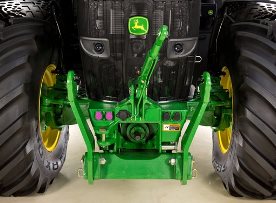 Front PTO
Front PTOFor increased versatility, two 1000-rpm front PTO options are available from the factory for 7R and 8R Series Tractors equipped with the John Deere front hitch.
Front PTO features include:
7R-specific features:
8R-specific features:
Intelligent Power Management (IPM)
IPM is compatible with 7R and 8R Series Tractors equipped with a front PTO option. The front PTO, rear PTO, or transport speeds can activate IPM on 7R Tractors. However, on 8R Tractors, IPM is only activated by the rear PTO or by transport speeds. For example:
Disconnecting the PTO drive to the PTO box when not in use increases tractor efficiency by reducing:
Refer to the operator’s manual for instructions on how to disconnect the PTO when not in operation.
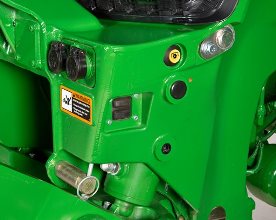 Remote control at front of tractor
Remote control at front of tractor Front PTO engagement is actuated through an engagement switch similar to the rear PTO located on the CommandARM™ controls.
NOTE: For the 8R Series, if the tractor is equipped with a front PTO, additional IPM power will transfer through the front PTO. However, IPM activation is only sensed through the rear PTO. Adequate load must be sensed on the rear PTO in order for IPM to activate.
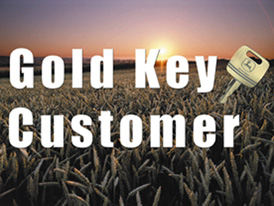

The John Deere Waterloo Operations Gold Key Program was designed to recognize and honor those purchasing Waterloo-built tractors. The Gold Key tour provides an opportunity for a customer to follow his or her tractor as it is built on the assembly line. If a Gold Key customer is unable to visit the day the tractor is on the assembly line, the customer may elect an alternative date within 90 days to schedule a tour. This will be recognized as a Gold Key experience where the customer adopts a tractor to follow rather than watch his or her own tractor being built. After 90 days, the visit will be deemed a VIP tour and Gold Key memorabilia will not be provided.
A Gold Key tour entails an exclusive, behind-the-scenes guided tour of the assembly production lines. The customer, or product owner, may bring up to three additional guests on the tour. Tour participants will wear Gold Key owner identification bump caps and other personal protective equipment while being escorted privately by a tour guide. Every attempt will be made to make sure the customer will see the specific tractor ordered come off the final assembly line; however, in order to satisfy delivery needs, the first priority is to keep the manufacturing lines running at full capacity.
The Gold Key visit date is based on when the customer’s tractor is expected to reach the final line. It is John Deere’s goal that a customer drives his or her tractor off the final line at the end of the tour. It is imperative to notify the John Deere dealer from whom the tractor was purchased in order to initiate a Gold Key tour. The John Deere dealer will be required to register guests on the Gold Key registration website as soon as possible if a Gold Key visit is requested. The owner will be presented with a gold key, a certificate, and other memorabilia at the conclusion of the factory visit. Breakfast and lunch will also be provided the day of the tourisit.
The owner will need to notify the John Deere dealer where the Waterloo-built 6000 Series – 9000 Series Tractor was purchased. The Gold Key coordinator will be the sole contact with the dealership representative to make visit arrangements and confirmations for the visit.
Shortly after the Gold Key coordinator confirms the request, all appropriate paperwork and information will be sent to the dealer. The customer will then receive all welcome documents in the mail. The Gold Key coordinator will also make direct contact with the customer to confirm the visit.
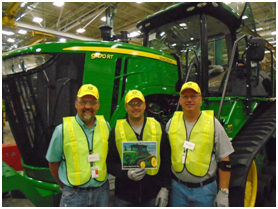 Ahrens Farms
Ahrens Farms
Ahrens Farms of Owatonna, MN participated in the Gold Key Tour at John Deere Waterloo Works in 2015. They purchased a 9470RT Tractor.
While every attempt will be made, and the factory will do everything possible to allow a customer to see his or her tractor being built, production schedules change for many reasons. Should production change at the last minute, the owner may arrive only to find that either the tractor has been pushed back or pulled ahead and already built. While that is certainly not the intention, the possibility remains.
The factory cannot be responsible for:
The 4200 and 4600 CommandCenter, also known as the Generation 4 CommandCenter, create the primary user interface for 6R, 7R, 8R/8RT, and 9R/9RT/9RX Tractors; F4365 High-Capacity Nutrient Applicator; 4 Series Self-Propelled Sprayers; and S700 Combines. The Generation 4 CommandCenter provides an excellent, user-savvy, efficient operating experience.
Generation 4 CommandCenter is available in the following configurations:
For growers wanting to maximize their viewing real estate, the 25.4-cm (10-in.) touchscreen color display is an excellent choice. With the 25.4-cm (10-in.) display, the title bar and all shortcut keys may be viewed at all times, allowing operators to monitor more information at once.
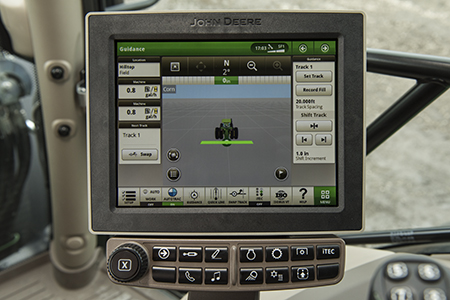 John Deere 4200 CommandCenter
John Deere 4200 CommandCenterA. Next run page
B. Status center
C. Expand shortcut keys
D. Menu
E. Run page
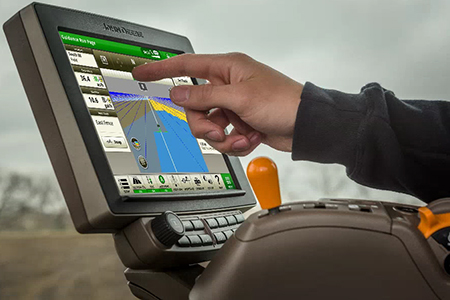 John Deere 4600 CommandCenter
John Deere 4600 CommandCenterA. Next and previous run page
B. Status center
C. Shortcut keys
D. Menu
E. Run page
F. Title bar
A Generation 4 CommandCenter is made up of a processor and a display. Two processor options are available for the Generation 4 CommandCenter.
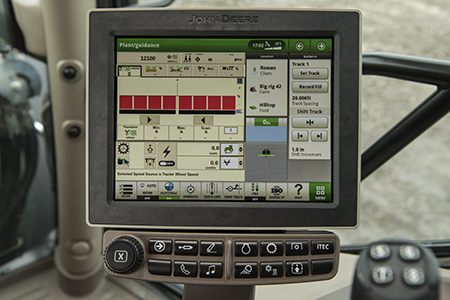 4200 CommandCenter 21.3-cm (8.4-in.) display
4200 CommandCenter 21.3-cm (8.4-in.) displayThe 4200 Processor is base equipment and only offered on 6R, 7210R, and 7230R Tractors.
It offers:
The table below shows the model year of machines equipped with CommandCenter. Upgrade kits are available for 4100 to 4600 for machines that came equipped with a 4100 CommandCenter from the factory. There are no upgrade kits for converting a 4200 to 4600 at this time.
4200 CommandCenter is available starting with model year 2019 6R, 7210R, and 7230R Tractors.
| Vehicles | Model year | 4200 Processor | 4600 Processor |
| John Deere tractors | |||
| 6R Series (AutoQuad™ transmission/CommandQuad™ transmission) Series | 2019 and newer | Standard | Not applicable |
| 6R (IVT transmission/DirectDrive), 7210R, 7230R Series | 2019 and newer | Standard | Option |
| 7250R, 7270R, 7290R, 7310R Series | 2014 and newer | Not available | Standard |
| 8R/8RT Series | Mid-2014 and newer | Not available | Standard |
| 9R/9RT/9RX Series | 2015 and newer | Not available | Standard |
| John Deere nutrient applicators | |||
| F4365 Nutrient Applicator | 2017 and newer | Not available | Standard |
| John Deere self-propelled sprayers | |||
| 4 Series Sprayers | 2018 and newer | Not available | Standard |
| John Deere combines | |||
| S-Series Combines | 2018 and newer | Not available | Standard |
Expect easier set-up, along with increased operator confidence, thanks to a simple, customizable interface. The improved design of the Generation 4 CommandCenter also aids in an optimal operating experience and maximizes uptime.
Some of the easy-to-use benefits of the Generation 4 CommandCenter include:
Producers can use a variety of implements with the Generation 4 CommandCenter as it is Agricultural Industry Electronics Foundation (AEF) ISOBUS compliant for manual control of IOSBUS implements (UT) as well as automatic section control (TC-SC) and documentation in ISOXML format (TC-Basic).
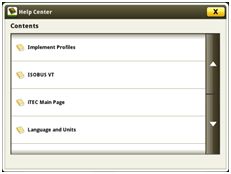 Help center main page
Help center main pageAdditionally, application-based help is also available in all locations of the CommandCenter. Simply click on the {i} icon available on the title bar and it will lead directly to more information on the application currently being used.
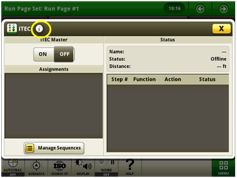 Context-based help icon
Context-based help icon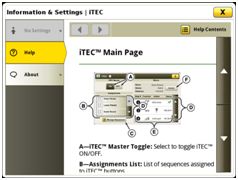 Context-based help on iTEC™ system main page
Context-based help on iTEC™ system main pageDiagnostic text and information is available for better understanding of whether applications are operating as directed.
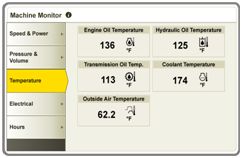 Machine monitor page
Machine monitor pageThe machine monitor application provides the operator instantaneous readings about the status or condition of the machine. Values shown in the machine monitor vary by application, but typically include parameters like engine speed, coolant temperature, and ground speed. The machine monitor supports run page modules in the Layout Manager, allowing the operator to populate specific machine parameters directly to a run page.
NOTE: The machine monitor application replaces part of the universal performance monitor in previous machines.
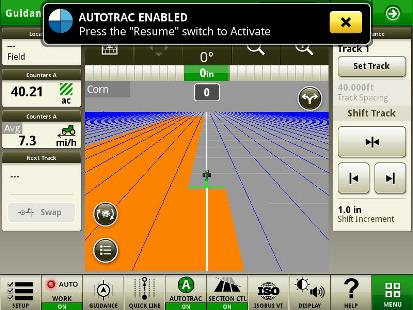 Work setup shortcut key (far left)
Work setup shortcut key (far left)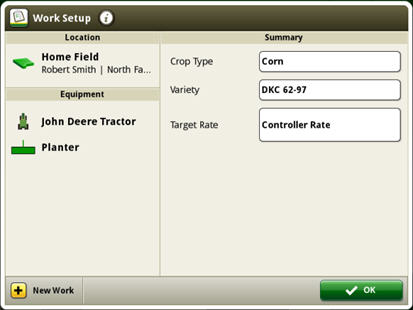 Work setup
Work setupVideo capability
Tractors with a 4200 CommandCenter are equipped with one video input, and the 4600 CommandCenter Display has four video inputs. The operator has the ability to set a variety of triggers, including reverse, PTO, hitch, and selective control valve (SCV) levers to activate the camera. Once triggered, the image will then appear on the CommandCenter display. The camera (video observation system) is available through JD Parts and Ag and Industrial (A and I) Products.
Video looping supported with Gen 4 4600 CommandCenter Display and 4640 Universal Display
This feature enables users to scan or loop through all of the available video feeds for a specified duration. The default scan time is set to 7 seconds per image. The scan time is customizable between 1 and 300 seconds per image before continuing the loop, providing constant visibility to all video feeds.
 4600 CommandCenter 25.4-cm (10-in.) Display
4600 CommandCenter 25.4-cm (10-in.) DisplayThe 4600 Processor is the premium processor, offered as an option on all 6R*, 7210R, and 7230R Tractors and is standard on 7250R, 7270R, 7290R, 7310R, 8R/8RT, 9R/9RT/9RX Tractors, F4365 Nutrient Applicator, 4 Series Self-Propelled Sprayers, and S700 Combines.
Available features with the premium processor include:
*Only compatible with Infinitely Variable Transmission (IVT™) and DirectDrive™ transmission
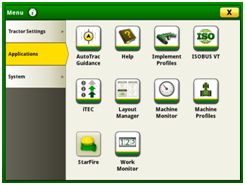 Layout manager selection page
Layout manager selection page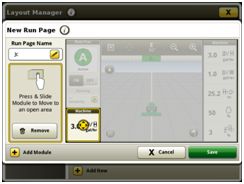 Layout manager module build
Layout manager module buildThe Generation 4 CommandCenter features a modular-designed layout manager, so operators can easily create the page views that meet their needs. From the factory, machines are equipped with default run pages. An unlimited number of run pages can be added to the Generation 4 CommandCenter based on operator preference or operational needs. Toggling between run pages is as easy as swiping the screen or using the arrow buttons on the top right portion of the title bar.
Users and access
Users and access allow the owner or manager to lock out certain functions to prevent operators from accessing or changing settings. Lock-out functions are managed with a defined four-digit code.
Lock-out features are available for:
Factory data reset
Hitch
Hydraulic
Transmission
Power take-off (PTO)
FieldCruise™ system
Display
Machine monitor
On-screen help and diagnostic text
There are a number of different ways to get meaningful on-screen help when navigating the Generation 4 CommandCenter. Operators can find the help icon on the shortcut bar on the bottom of every page. This icon gives detailed information on everything from tractor operation to application information. Simply select the help icon and navigate to the information section that is needed.
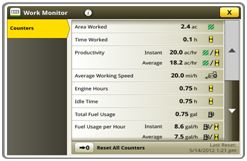 Work monitor page
Work monitor pageThe work monitor application displays performance information about the task being performed by the machine. The operator is shown averages, totals, and productivity of the machine, such as area worked, average working speed, and fuel usage. The values of the work monitor can be reset by the operator at any time. Specific values of the work monitor can be configured by the operator to be shown on a run page.
NOTE: The work monitor application replaces part of the Universal Performance Monitor in previous machines.
Work setup application
Work setup places the settings needed to properly setup AutoTrac, Documentation, and Section Control in a single location.
Settings include:
Work setup can be quickly accessed from a shortcut key or the display menu, allowing operators and managers to quickly review display and machine settings to ensure a job is completed properly.
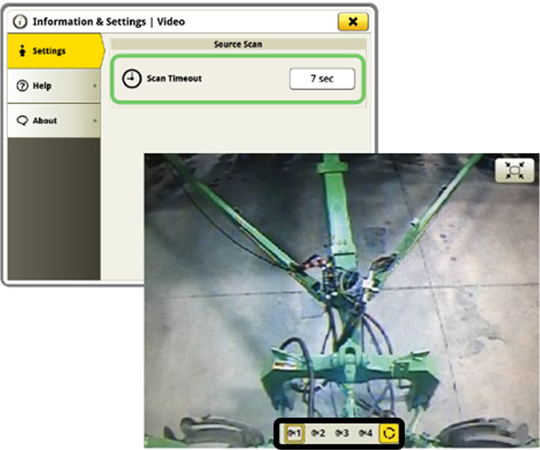
NOTE: 6R Tractors equipped with a 4600 CommandCenter Display have two video inputs.
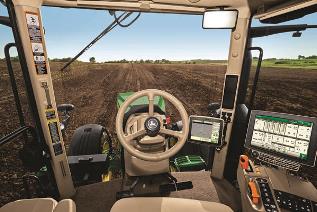 Dual display
Dual displayGeneration 4 CommandCenter display and GreenStar displays comparison and compatibility
The Generation 4 CommandCenter works in dual-display mode with GreenStar 3 2630 Display, GreenStar 2 1800 Display, and GreenStar 2 2600 Display.
Generation 4 CommandCenter may be configured to run with the following John Deere displays connected at the cornerpost of a John Deere tractor:
Vehicle applications will always be located on the Gen 4 CommandCenter.
View on-screen help to properly set up the display when in dual-display mode by clicking on the icon (pictured below).
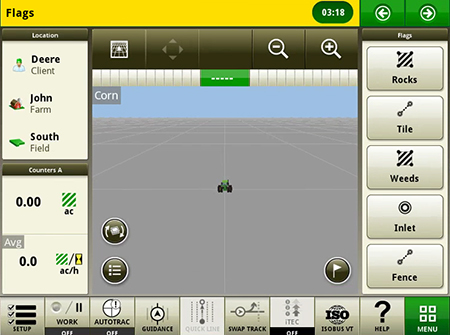 Create flags to mark items in the field
Create flags to mark items in the fieldMark areas of the field that need special attention or items that need to be addressed such as rocks, tile lines, or weed pressure. Flags previously recorded on the Gen 4 or GreenStar™ 3 2630 Display can be transferred between displays to ensure each operator is aware of upcoming field obstacles.
Document field boundaries
Manually drive field boundaries with the Generation 4 CommandCenter or import existing boundary information from the GreenStar 3 2630 Display or John Deere Operations Center. Gen 4 documentation data can be used to create boundaries from coverage within the John Deere Operations Center.
The display uses a streamlined boundary creation process that generates exterior and interior field boundaries from coverage, simplifying the process and reducing steps. Operators can delete interior boundaries without impacting the exterior boundary or headlands. In addition, operators can choose to turn boundaries off for section control while using them for field locator and documentation.
Headland boundaries can also quickly be generated by simply entering a distance or the number of passes from an exterior boundary.
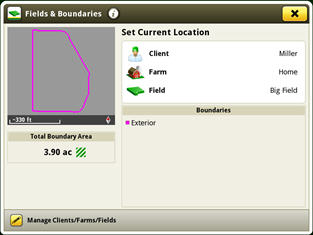 Boundary creation from coverage
Boundary creation from coverage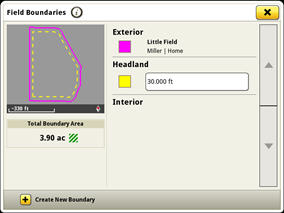 Headland creation
Headland creationBoundaries can be imported from the following sources:
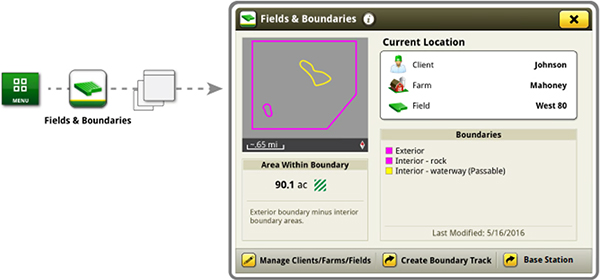 Setup base stations in Fields & Boundaries applications
Setup base stations in Fields & Boundaries applicationsCustomers using John Deere RTK Radio 450 or 900 can link a base station to a desired client/farm/field. This allows automatic switching to the associated base station when changing fields. The ability to import base station assignments into Operations Center and send back to machines will be available at a later date.
Compare the specifications of up to 4 models
| Key Specs | 8370rt-tractor Current Model |
|---|---|
| Engine description | John Deere PowerTech™ PSS 9.0 L (B20 diesel compatible) |
| Engine displacement | 9 L 549 cu in. |
| Rated engine power | 97/68EC: 272 kW 370 hp |
| Rated PTO power (hp SAE) | 225 kW 303 hp |
| Transmission type | Standard: John Deere AutoPowr™ IVT™ 40K, 0.05-42 km/h 26 mph Optional: e23 Powershit with Efficiency Manager™ 40K, 40 km/h |
| Hydraulic pump rated output | Standard: 85-cc pump: 227.1 L/min 60 gpm |
| Rear hitch category (SAE designation) | Standard: Category 4N/3: 6,803 kg (15,000 lb) at 610 mm behind hitchpoint Optional: Category 4N/3: 9,072 kg (20,000 lb) at 610 mm behind hitchpoint |
| Base machine weight | 15,364 kg 33,871 lb |
| Maximum PTO power | |
| Maximum engine power | |
| Engine specifications | |
| Description | John Deere PowerTech™ PSS 9.0 L (B20 diesel compatible) |
| Engine type | Diesel, in-line, 6-cylinder, wet-sleeve cylinder liners with 4 valves-in-head |
| Engine family | JJDXL09.0308 |
| Rated speed | 2,100 rpm |
| Aspiration | Dual series turbocharger with fixed geometry first stage, variable geometry second stage; air-to-air aftercooling and cooled exhaust gas recirculation |
| Cylinders liners | |
| Emission level | Final Tier 4 |
| After treatment type | DOC/DPF/SCR |
| Displacement | 9 L 549 cu in. |
| Engine performance | |
| Rated power | 97/68EC: 272 kW 370 hp |
| Rated PTO power (hp SAE) | 225 kW 303 hp |
| Power boost | 10 percent |
| Engine peak torque | At 1600 rpm: 1,732 Nm 1,277 lb-ft |
| PTO torque rise | 40 percent |
| Intelligent Power Management (available in transport and/or mobile PTO applications) | |
| Maximum PTO power | |
| Maximum engine power | |
| Transmission | |
| Type | Standard: John Deere AutoPowr™ IVT™ 40K, 0.05-42 km/h 26 mph Optional: e23 Powershit with Efficiency Manager™ 40K, 40 km/h |
| Reverser | |
| Clutch; wet/dry | |
| Creeper | |
| Hydraulic system | |
| Type | Closed-center, pressure/flow compensated |
| Pump rated output | Standard: 85-cc pump: 227.1 L/min 60 gpm |
| Available flow at a single rear SCV | 0.5 in. couplers: 132 L/min 35 gpm 0.75 in. couplers: 159 L/min 42 gpm |
| Number of rear selective control valves (SCVs) | Standard: 10.5 in. ISO couplers: 4 Optional: 0.5 in. ISO couplers: 5 and 6 available 0.75 in. ISO coupler: 1 |
| Number of mid selective control valves (SCVs) | |
| Joystick SCV control | |
| SCV control | Electronic |
| Available flow at front SCVs | |
| Number of front selective control valves (SCVs) | |
| Rear hitch | |
| Hitch draft control load sense type | |
| Remote control valves available | |
| Hitch category (SAE designation) | Standard: Category 4N/3: 6,803 kg (15,000 lb) at 610 mm behind hitchpoint Optional: Category 4N/3: 9,072 kg (20,000 lb) at 610 mm behind hitchpoint |
| Maximum lift capacity behind lift points | Category 4 4N/3: 9,072 kg (20,000 lb) at 610 mm behind hitchpoint |
| Sensing type | Electrohydraulic |
| Rear axle differential lock | |
| Lift capacity at standard frame | |
| Drawbar | |
| Drawbar category | Standard: Category 4 Optional: Category 4 with heavy duty support |
| Maximum vertical load | Standard: 2,245 kg 4,950 lb Optional: 4990 kg (11,000 lb) (dependent on drawbar position) |
| Rear power take-off (PTO) | |
| Type | Independent Standard: 46 mm (1.75 in.) 20-spline, 1,000 rpm |
| Engine rpm (at rated PTO speeds) | 1,000 PTO rpm @ 2,000 engine rpm |
| PTO actuation | |
| Ground speed PTO option availability | |
| Multispeed PTO option availability | |
| Rear axle | |
| Final drive type | Inboard planetary |
| Differential controls | |
| Axle type | |
| Brakes, type and control | |
| Load rating | |
| Rear differential lock | |
| Type | |
| Tires | |
| Wheel tread range | 1,828.8 to 3,048 mm 72 - 120 in. 2,844.8 to 4,064 mm 112 - 160 in. |
| Turning radius without brakes | |
| Front | |
| Rear | |
| Turning radius with brakes | |
| Steering | |
| Type | Standard: Speed-sensitive, hydrostatic, differential: 406 mm diameter steering wheel - 1.8 turns lock-to-lock |
| Electrical system | |
| Alternator size | Standard: 200 amp |
| Battery options | 12 V |
| Total cold cranking amps | 1,850 CCA |
| Type of bulb in beacon (Halogen, Zenon, LED) | |
| Type of bulb in headlight (Halogen, Zenon, LED) | |
| Working lights | |
| dB(A) rating for backup alarm | |
| Operator station | |
| Rollover protective structure, OOS | |
| Seat | Standard: ComfortCommand™ Optional: ActiveSeat™ |
| Cab suspension | |
| Instructional seat | Standard |
| Display | Standard: 4100 Generation 4 CommandCenter™ with 7 in. display Optional: 4600 Generation 4 CommandCenter™ with 10 in. display |
| Radio | Standard: AM/FM stereo with weatherband, remote controls, auxiliary input jack, four speakers and external antenna |
| Inner cab volume | 3.597 m3 127 cu ft |
| dB(A) rating | |
| Cab glass area | 6.52 m2 70.18 sq ft |
| Front visibility | |
| Safety glass rating | |
| Dimensions | |
| Wheelbase | |
| Drawbar clearance | |
| Approximate shipping weight, Open;Cab | |
| Front axle center | |
| Overall height | |
| Overall length | |
| Weight | |
| Base machine weight | 15,364 kg 33,871 lb |
| Maximum ballast level | 17,690 kg 39,000 lb |
| Maximum permissible weight | 19,958 kg 44,000 lb |
| Capacities | |
| Crankcase oil volume | 25 L 6.8 U.S. gal. |
| Fuel tank | 750 L 200 U.S. gal. |
| Diesel exhaust fluid (DEF) tank | 25.3 L 6.7 U.S. gal. |
| Cooling system | 32.6 L 8.6 U.S. gal. |
| Transmission-hydraulic system | 180 L 47.5 U.S. gal. |
| Serviceability | |
| Interval for engine oil change | 500 hours |
| Interval for hydraulic/transmission oil change | 1,500 hours |
| Interval for engine coolant change | 6,000 hours |
| Precision AG | |
| Guidance | AutoTrac Ready |
| Telematic | Available with JDLink™ hardware, activations, and Ethernet Harnesses (availability dependent upon destination) |
| Remote diagnostics | Available with activated JDLink™ hardware and activations |
| Miscellaneous | |
| Country of manufacture | USA |
| Side slope rating | |
| Uphill/downhill slope rating | |
| Front axle | |
| Front axle differential lock | |
| Load rating | |
| Type | |
| Front hitch | |
| Category | |
| Electric power | |
| Front power take-off (PTO) | |
| PTO speed | |
| Standard lift capacity | |
| Loaders | |
| Lift capacity at full height | |
| Loader | |
| Maximum lift height | |
| Tracks | |
| Drive type | |
| Midrollers | |
| Track width | |
| Tread spacing |
© COPYRIGHT 2025 LEGACY EQUIPMENT - ALL RIGHTS RESERVED| Privacy Policy | Powered By